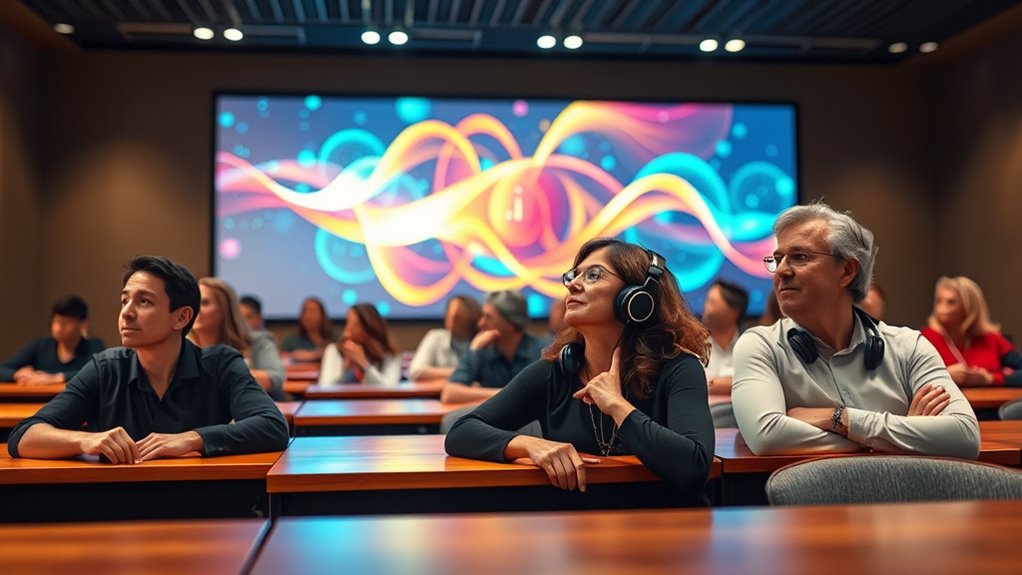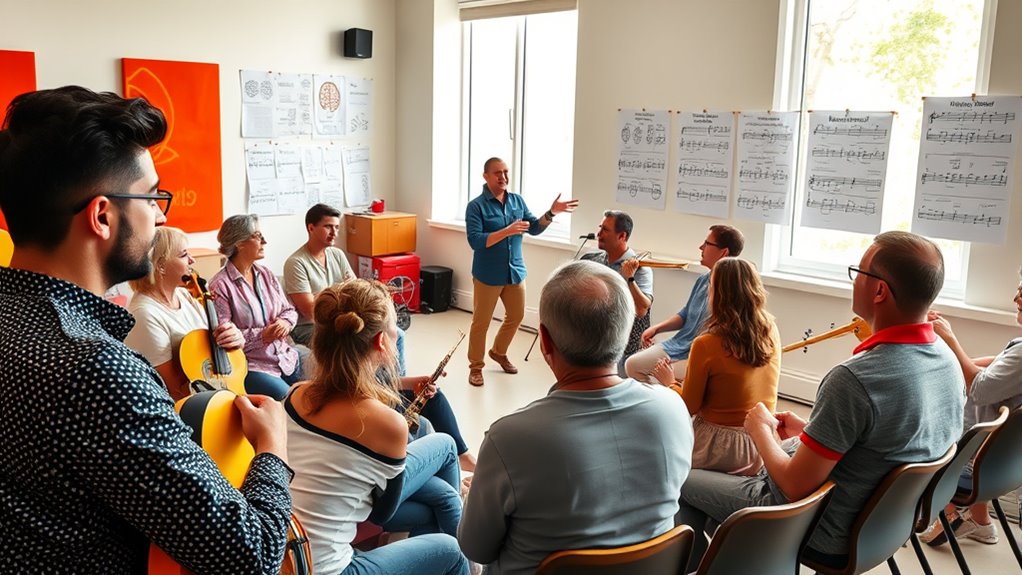Combining music appreciation with cognitive intelligence strategies (CIS) is a powerful way to boost your brain’s health. By actively engaging with diverse genres, practicing rhythm exercises, and reflecting on your emotional responses, you strengthen neural pathways and improve memory, focus, and emotional regulation. Repeating listening routines and analyzing musical elements enhance neuroplasticity, making your brain more adaptable. Keep exploring these techniques, and you’ll uncover deeper ways to optimize your mental agility and enjoyment.
Key Takeaways
- Combine active music listening with CIS techniques like focused attention and genre diversity to strengthen neural pathways.
- Incorporate rhythm exercises and musical improvisation to enhance neural plasticity and cognitive flexibility.
- Set daily goals for varied musical engagement, exploring different genres to boost auditory perception and emotional recognition.
- Use visualization, reflection, and high-quality recordings to deepen emotional awareness and reinforce memory through music.
- Create distraction-free environments and routine practices to optimize brain training and long-term cognitive benefits from music appreciation.
Understanding the Connection Between Music and Brain Health

Music has a powerful effect on your brain, influencing mood, memory, and cognitive function. When you listen to music, especially with complex musical harmony, your brain responds by strengthening neural connections. This process enhances brain plasticity, allowing your mind to adapt and grow through experience. The harmony within music stimulates various brain regions, encouraging new pathways to form and existing ones to strengthen. As a result, your brain becomes more flexible and resilient. Engaging with musical harmony doesn’t just boost your mood—it actively supports your brain’s ability to reorganize itself. Additionally, consistent exposure to musical harmony can promote long-term neuroplastic changes that sustain cognitive health. This connection between music and brain health highlights how musical experiences can foster long-term cognitive benefits, making music a valuable tool for maintaining and improving mental agility.
The Science Behind Cognitive Intelligence Strategies (CIS)

Cognitive Intelligence Strategies (CIS) work by strengthening neural pathways, making your brain more efficient. As you engage with music, your memory and ability to learn improve considerably. This science-backed approach helps you maximize mental performance through targeted activities. Additionally, detecting and correcting passive voice in your writing can enhance clarity and engagement.
Neural Pathway Enhancement
Enhancing neural pathways is a fundamental aspect of strengthening your cognitive abilities through CIS. Your brain’s neural plasticity allows it to adapt and form new connections, which is crucial for learning and problem-solving. By engaging in specific activities, you promote synaptic strengthening, making neural communication more efficient. To boost this process:
- Practice focused music listening to stimulate brain regions involved in auditory processing.
- Incorporate varied musical genres to challenge your neural networks.
- Use active engagement, like analyzing or playing an instrument, to deepen neural connections.
- Repeat exercises consistently to reinforce synaptic pathways and support long-term neural plasticity.
- Recognize the importance of brain plasticity in adapting and strengthening neural pathways, which is essential for cognitive development.
These strategies help your brain build robust neural pathways, improving overall cognitive function and adaptability through targeted CIS techniques.
Memory and Learning Boost
Have you ever wondered how some people effortlessly remember new information and learn quickly? It’s often due to effective memory and learning boosts from techniques like rhythm exercises, which strengthen neural connections. Engaging with genre diversity in music exposes your brain to varied patterns, enhancing cognitive flexibility. These strategies improve your ability to encode and retrieve information efficiently. To understand this better, consider the following table:
| Technique | Focus Area | Benefits |
|---|---|---|
| Rhythm exercises | Timing and pattern | Memory retention |
| Genre diversity | Musical variety | Cognitive flexibility |
| Repetition | Reinforcement | Long-term learning |
| Active listening | Focus and engagement | Better comprehension |
| Cross-training in music | Multiple skills | Brain adaptability |
Incorporating diverse genres and rhythm exercises strengthens your brain’s learning capacity.
Selecting Music to Maximize Brain Engagement

Choosing the right music is key to maximizing your brain engagement. To do this effectively, consider how musical genres influence your focus and mood. For example, classical or instrumental music can boost concentration, while upbeat genres energize you. Additionally, your listening environment matters—quiet spaces reduce distractions, while background music in active settings can enhance alertness. Here are four tips:
- Select genres that match your activity, like calming music for studying.
- Avoid overly complex or loud tracks that may overwhelm your focus.
- Opt for high-quality recordings to ensure clear sound.
- Adjust volume to a comfortable level, so it supports rather than distracts.
Understanding music genres can help you choose the most effective tracks for brain engagement.
Techniques for Mindful Music Listening

Once you’ve selected music that aligns with your activity, practicing mindful listening can deepen your engagement and improve your overall experience. Start by focusing on the rhythm; notice how the beat influences your mood and physical sensations. Incorporate rhythm therapy techniques by tapping along or feeling the pulse in your body. Next, shift your attention to melodic mindfulness—listen closely to the melodies, harmonies, and nuances in the music. Avoid distractions and give each element your full attention. Breathe deeply and observe how different sounds evoke emotions or memories. This active awareness helps you connect more deeply with the music, fostering a sense of presence. Considering the importance of high-quality audio, investing in a good sound system or headphones can significantly enhance your mindful listening experience. With consistent practice, mindful listening transforms passive hearing into an enriching, brain-boosting experience.
Enhancing Memory Through Musical Recall Exercises

Engaging in musical recall exercises can considerably boost your memory by actively retrieving familiar tunes and patterns. These exercises strengthen your ability to remember melodies and rhythms through consistent practice. To improve your melodic memorization and rhythmic recall, try these strategies:
- Play a familiar song and pause, then try to recall the next section.
- Sing melodies from memory, focusing on accuracy and pitch.
- Clapping or tapping out rhythmic patterns to reinforce rhythmic recall.
- Listen to a tune, then reproduce it without assistance, enhancing your retention.
- Incorporate memory techniques like visualization or association to deepen your musical recall skills.
Developing Focus With Active Music Analysis

Building on your memory exercises, developing focus through active music analysis involves consciously examining musical elements to deepen your understanding. As you listen, pay close attention to details like rhythm synchronization, noticing how the beats align and shift. Engage with musical improvisation by imagining how the performers create and alter melodies spontaneously, sharpening your attention to nuance. Focus on identifying patterns, variations, and contrasts within the piece, which helps train your brain to stay alert and attentive. By actively analyzing these components, you enhance your ability to stay present during music, improving concentration. This deliberate engagement encourages your brain to process complex musical structures, fostering a more profound appreciation and a sharper focus during listening sessions. Incorporating mindfulness practices during your analysis can further enhance your spiritual well-being and deepen your connection to the music.
Using Music to Improve Emotional Recognition and Regulation

Music can serve as a powerful tool for improving emotional recognition and regulation by providing a safe space to explore and identify feelings. Listening intentionally allows you to boost emotional awareness and better understand your moods. To do this effectively, try:
- Paying close attention to how different songs make you feel.
- Noting changes in mood during various musical passages.
- Choosing music that reflects or influences your current emotional state.
- Using songs to help shift your mood or calm intense feelings.
- Exploring diverse music genres can enhance your understanding of emotional expression and music technology.
Practical Activities to Integrate CIS Into Your Music Routine

To effectively incorporate CIS into your daily routine, try setting aside specific times for intentional listening sessions. During these sessions, focus on active engagement with the music, emphasizing rhythm synchronization. Play along with songs, tapping or drumming to match the beat, which enhances your sense of timing and coordination. You can also explore musical improvisation by experimenting with melodies or rhythms, encouraging your brain to adapt and develop new neural connections. Additionally, pause frequently to analyze different elements of the music—melody, harmony, and rhythm—making your listening more interactive. Incorporating active listening techniques can further reinforce your ability to process musical nuances more effectively. Making these activities routine helps train your brain to process musical nuances more effectively, strengthening your cognitive and emotional responses to music over time.
Tracking Your Cognitive Progress With Musical Practice

Tracking your cognitive progress with musical practice allows you to see how your skills develop over time and identify areas for improvement. By paying attention to changes, you harness neural plasticity and enhance your auditory processing. To effectively monitor progress, consider these steps:
- Record your practice sessions regularly to observe improvements.
- Note specific challenges to target in future practice.
- Use simple tests, like identifying pitch or rhythm changes, to assess auditory processing.
- Track how quickly your brain adapts to new pieces or techniques, reflecting neural plasticity.
- Understanding the divorce process in various states can help you recognize the importance of legal procedures and planning—much like structuring your musical practice for optimal growth.
This ongoing assessment helps you understand your brain’s response to musical training, making your practice more intentional. Over time, your auditory processing sharpens, and your neural pathways strengthen, supporting overall cognitive growth.
Tips for Making Music Appreciation a Daily Brain-Boosting Habit

To turn music appreciation into a daily habit, start by setting achievable listening goals each day. Explore different genres regularly to keep your mind engaged and broaden your musical taste. Don’t forget to reflect on how the music makes you feel, as this deepens your emotional connection and boosts your brainpower.
Set Daily Listening Goals
Setting clear daily listening goals helps you turn music appreciation into a consistent habit that boosts your brain. To do this effectively:
- Decide how many minutes you’ll dedicate each day, whether 10 or 30, to build momentum.
- Choose specific musical genres to explore, broadening your auditory palette.
- Create a dedicated listening environment free from distractions to focus fully on the music.
- Vary your playlist to include different styles, ensuring your brain stays engaged and challenged.
Explore Varied Genres Regularly
Exploring a variety of musical genres regularly keeps your brain engaged and enhances your appreciation skills. Embracing genre diversity exposes you to different rhythms, melodies, and cultural influences, enriching your musical exploration. By intentionally listening to genres outside your comfort zone—like jazz, classical, reggae, or electronic—you challenge your auditory perception and broaden your musical palette. This habit encourages active listening and sharpens your ability to identify unique stylistic elements. Making genre diversity a daily practice not only keeps your brain stimulated but also deepens your understanding of music’s versatility. Over time, you’ll develop a more nuanced appreciation for different musical traditions, making your listening experience more rewarding and intellectually engaging. Consistent musical exploration is key to cultivating a richer, more diverse appreciation.
Reflect on Musical Emotions
Reflecting on the emotions that music evokes can transform your listening into a powerful brain-boosting habit. By tuning into your emotional resonance, you strengthen your musical intuition and deepen your understanding. To make this a daily practice, try these steps:
- Identify the feelings you experience during a piece—joy, sadness, nostalgia—and note how they shift throughout the song.
- Ask yourself why certain melodies or rhythms trigger specific emotions, fostering emotional resonance.
- Compare your reactions to different genres to see how your musical intuition guides your emotional responses.
- Keep a journal of your reflections to track patterns and enhance your emotional awareness over time.
This mindful approach helps you connect more deeply with music, enriching your brain’s capacity for emotional and cognitive growth.
Frequently Asked Questions
How Does Different Music Genres Affect Brain Activation Differently?
Different music genres influence your brain activation in unique ways. Genre effects can stimulate various areas, like how classical music activates emotional and memory centers, while energetic genres like rock boost alertness and motivation. You might notice that calm genres relax you, engaging your parasympathetic nervous system, whereas upbeat music increases activity in the reward and motor regions. Understanding these genre effects helps you harness music’s power to shape your mood and focus.
Can Musical Training Improve Overall Cognitive Functions Beyond Memory?
Did you know that musical training can boost your brain’s neuroplasticity? It’s true—studies show it enhances attention, problem-solving, and even language skills. When you practice music, you’re not just learning notes; you’re strengthening neural pathways that improve overall cognitive functions. So, beyond memory, music sharpens your focus and adaptability, helping your brain stay flexible and resilient. Keep playing, and you’ll see these benefits extend into many areas of life.
What Age Is Best for Starting Music Appreciation for Cognitive Benefits?
You might wonder when to start music appreciation for cognitive benefits. Early childhood is ideal because your brain is highly adaptable, making it easier to develop skills and enhance learning. However, it’s never too late—lifelong learning keeps your mind sharp at any age. Beginning at any stage can boost memory, focus, and creativity, so embrace musical exploration whenever you can for lasting cognitive advantages.
How Do Individual Musical Preferences Influence Brain Engagement Levels?
Did you know that your musical taste can shape your brain response? When you enjoy a song, your brain engages more actively, releasing dopamine and strengthening neural connections. Your individual musical preferences influence how intensely your brain responds—favorite genres boost engagement and memory. So, choosing music you love maximizes cognitive benefits, making your listening experience more impactful and enjoyable. Your unique taste truly directs how your brain benefits from music.
Are There Specific Instruments That Provide Greater Cognitive Stimulation?
You might wonder which instruments offer the greatest cognitive impact. Instrument focus varies, but studies suggest that playing or listening to complex instruments like the piano or violin can boost brain activity more than simpler ones. These instruments challenge your memory, coordination, and auditory skills, leading to enhanced cognitive stimulation. So, engaging with these instruments can markedly sharpen your mental faculties, making your musical experience both enjoyable and brain-boosting.
Conclusion
Think of your mind as a garden, and music as the nourishing sunlight. By regularly engaging with mindful listening and cognitive strategies, you’re cultivating vibrant blooms of memory, emotion, and intelligence. Each musical moment is a seed planted, growing stronger with your attention and care. Embrace this daily ritual, and watch your brain flourish—turning the symphony of sounds into a beautiful, resilient landscape of mental vigor.











